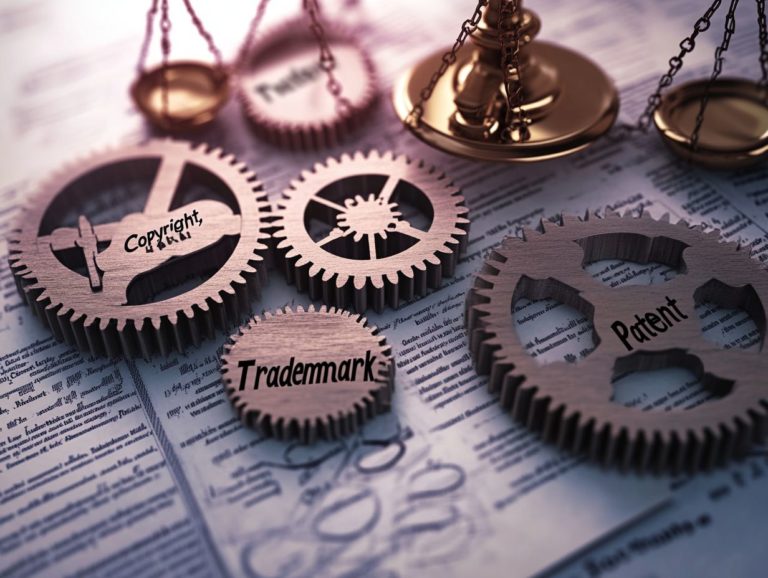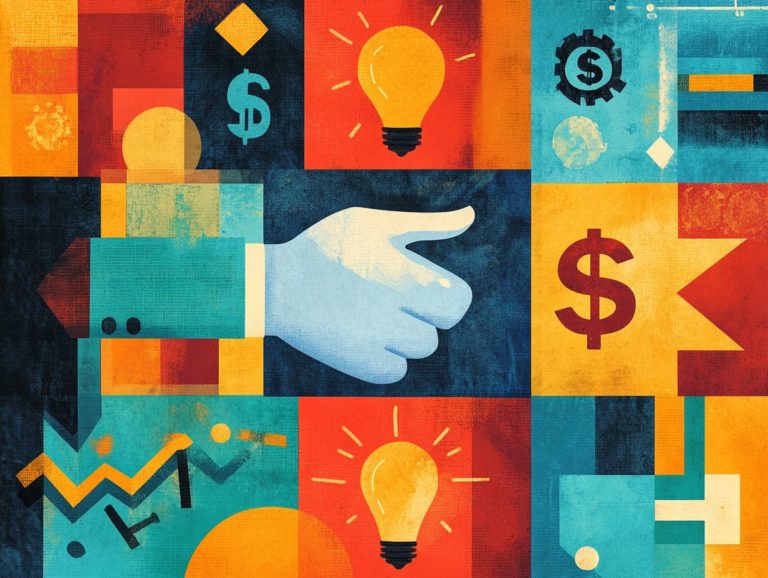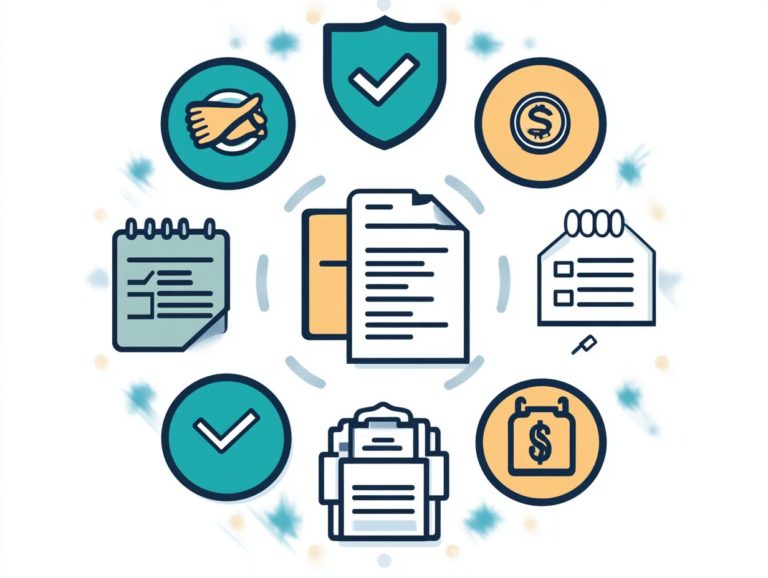The Future of Digital Licensing Agreements
Digital licensing agreements are transforming the way you and other businesses protect intellectual property in our increasingly digital landscape.
As you move from traditional contracts to more streamlined digital formats, you’ll discover numerous advantages, such as improved efficiency, heightened security, and greater accessibility. However, these agreements also come with unique challenges that require careful navigation.
Discover how digital licensing agreements can transform your business. This article delves into the evolution and benefits of digital licensing agreements, addresses potential obstacles, and shares best practices for crafting effective contracts. Additionally, it offers insights into the future of this essential legal framework.
Contents
- Key Takeaways:
- What are Digital Licensing Agreements?
- The Evolution of Digital Licensing Agreements
- Benefits of Digital Licensing Agreements
- Challenges of Digital Licensing Agreements
- The Future of Digital Licensing Agreements
- Best Practices for Creating and Enforcing Digital Licensing Agreements
- Frequently Asked Questions
- What are digital licensing agreements?
- How is the future of digital licensing agreements changing?
- What impact will artificial intelligence have on digital licensing agreements?
- How will blockchain technology affect digital licensing agreements?
- What challenges will digital licensing agreements face in the future?
- Qu papel jugar la privacidad de datos en los contratos digitales?
Key Takeaways:

Digital licensing agreements offer efficiency and cost savings compared to traditional contracts.
Addressing legal and technological concerns is crucial for the future success of digital licensing agreements.
What are Digital Licensing Agreements?
Digital licensing agreements are cutting-edge contracts that enable you to share and utilize intellectual property across many industries, from consumer products to digital content.
These agreements simplify the permission-granting process, ensuring compliance with quality standards while unlocking creative opportunities through brand collaborations.
As your business navigates an ever-evolving digital landscape, the importance of the process of creating, managing, and monitoring contracts from start to finish cannot be overstated.
Whether you re involved in licensing deals for gaming collaborations or beauty and wellness products, digital licensing agreements are vital to the licensing industry.
These agreements are especially significant because they not only safeguard the rights of creators but also boost revenue streams through well-structured licensing strategies.
Unlike traditional contracts, which can feel cumbersome and static, digital agreements often include dynamic terms that allow for real-time adjustments to accommodate market shifts. This level of flexibility is crucial for meeting the unique demands of industries like music, software, and merchandise.
The rise of e-commerce has increased the need for transparent transactions, making digital licensing increasingly essential for compliance and monitoring. This focus on transparency ultimately fosters stronger partnerships and paves the way for innovative business models.
The Evolution of Digital Licensing Agreements
The evolution of digital licensing agreements signifies a remarkable transformation in the management of intellectual property. You re witnessing a shift from traditional contracts to streamlined digital solutions that align with the contemporary needs of the licensing industry.
This transition not only enhances efficiency but also adapts to the ever-changing landscape of digital commerce.
From Traditional Contracts to Digital Agreements
The transition from traditional contracts to digital agreements in the licensing industry has transformed how you manage your licensing deals, providing a competitive edge through improved efficiency and flexibility.
By embracing digital solutions, you can streamline the entire process of contract creation and approval. Unlike the old ways, which often involve tedious paperwork and lengthy turnaround times, digital agreements can be executed in real-time, speeding up royalty payments and contract modifications significantly.
These sophisticated systems come equipped with built-in tracking features that ensure compliance and transparency, instilling greater confidence in your arrangements. Consequently, you not only save valuable time but also reduce the risks of errors that often accompany manual documentation, ultimately enhancing how you manage your licensing agreements.
Benefits of Digital Licensing Agreements
Digital licensing agreements present you with a wealth of advantages, including substantial enhancements in efficiency and cost savings. They also provide improved security and accessibility for stakeholders, accommodating the diverse trends in licensing.
Embracing these agreements could revolutionize your approach, ensuring you stay ahead in an ever-evolving landscape.
Start leveraging digital licensing agreements today to maximize your business potential!
Efficiency and Cost Savings

One of the key advantages of digital licensing agreements lies in the remarkable efficiency and cost savings they offer, fundamentally transforming your business processes within the licensing industry.
By employing automated platforms for contract management, you can effortlessly track renewals and compliance. This sidesteps cumbersome manual processes that often lead to costly errors.
This innovation speeds up negotiations and cuts legal costs from missed deadlines.
You can harness real-time data analytics to evaluate the performance of your licensing agreements, enabling you to make informed decisions that optimize your returns on investment.
Advancements in digital licensing streamline operations and boost productivity, showcasing how technology can serve as a powerful catalyst for substantial financial gains.
Improved Security and Accessibility
Digital licensing agreements give you powerful security and easy access to your essential documents, ensuring that you meet legal standards while simplifying access for stakeholders.
These agreements act as a protective shield for your business, making the verification process smoother and minimizing the risk of unauthorized access to sensitive information.
By employing robust encryption methods and secure authentication protocols, your licensing framework not only safeguards intellectual property but also allows users to navigate effortlessly when retrieving documents.
This balance between security and accessibility is vital for you, helping your company comply with regulatory requirements and boosting overall operational efficiency. By fostering trust among partners and clients, you further strengthen your business relationships in an increasingly digital environment.
Challenges of Digital Licensing Agreements
While digital licensing agreements offer numerous advantages, you may still encounter challenges, particularly with legal and technological issues that can impact compliance in the licensing industry.
Addressing Legal and Technological Concerns
Addressing legal and technological concerns is essential for you to successfully adopt digital licensing agreements, ensuring compliance in the ever-evolving licensing landscape.
As a legal practitioner or technology expert, collaborating closely is key to navigating the intricate maze of copyright regulations and the rapid pace of technological advancements.
For example, you might encounter challenges with digital rights management (DRM) and encryption methods that impact both creators and end-users.
A comprehensive understanding of terms of use and compliance requirements can enable you to mitigate risks associated with infringement.
Implementing blockchain technology can significantly enhance transparency and efficiency in tracking licensed usage, while conducting regular audits helps ensure that all parties fulfill their obligations.
By embracing these best practices, you protect your intellectual property and contribute to a more sustainable digital environment.
The Future of Digital Licensing Agreements
The future of licensing agreements in a digital world is exciting and full of potential, with predictions indicating substantial advancements and developments poised to transform the licensing industry.
Embracing these changes can position you at the forefront of this evolving landscape, unlocking new opportunities and enhancing your strategic approach to licensing.
Ready to explore digital licensing agreements? Let’s transform your business today!
Predictions and Potential Developments

Predictions for digital licensing indicate that we are heading towards greater automation and seamless integration of technology. This shift will usher in new licensing trends that significantly enhance efficiency.
As industries evolve, the adoption of artificial intelligence and blockchain technology could revolutionize the management and enforcement of licensing agreements. Businesses may increasingly rely on digital agreements that automatically execute actions when conditions are met, effectively reducing administrative burdens and compliance risks.
The rise of data analytics provides valuable insights into consumer behavior, shaping how licenses are structured and presented.
These advancements will simplify processes and create exciting new opportunities for more dynamic licensing frameworks that adapt to market changes, ultimately benefiting both licensors and licensees in ways previously unimagined.
Best Practices for Creating and Enforcing Digital Licensing Agreements
Implementing best practices for crafting and enforcing digital licensing agreements is crucial for establishing effective agreements that maintain compliance within the licensing landscape.
By adhering to these practices, you can ensure that your agreements are robust and aligned with the evolving standards of the industry.
Key Considerations for Effective Agreements
When crafting digital licensing agreements, there are key considerations to address to ensure effectiveness and compliance with legal and industry standards.
First, understand the scope of the license, the rights granted, and the duration of use. These elements collectively shape how the digital product can be utilized. It s essential to incorporate clauses that protect intellectual property rights and clearly outline the responsibilities of both parties involved.
Additionally, prioritizing compliance with relevant laws, such as data protection regulations and copyright laws, is crucial to avoid potential legal entanglements. Establishing clear mechanisms for dispute resolution, along with monitoring and enforcement processes, can effectively safeguard the interests of all entities engaged in the agreement.
Frequently Asked Questions
What are digital licensing agreements?
Digital licensing agreements are legal contracts that describe the terms and conditions for the use of digital content, such as software, music, or images. These agreements grant individuals or businesses the right to use, distribute, or modify the content in exchange for payment or other considerations.
How is the future of digital licensing agreements changing?

The future of digital licensing agreements is being shaped by advances in technology and changes in consumer behavior. With the rise of streaming services and subscription-based models, traditional licensing agreements are evolving to adapt to new ways of consuming digital content, reflecting the future of licensing agreements in a global market.
What impact will artificial intelligence have on digital licensing agreements?
Artificial intelligence (AI) is expected to play a significant role in the future of digital licensing agreements. AI technology can help automate the process of creating and managing agreements, making them more efficient and cost-effective for both parties involved.
How will blockchain technology affect digital licensing agreements?
Blockchain technology, with its decentralized and transparent nature, is expected to revolutionize digital licensing agreements. It can provide a secure and immutable way to track and verify ownership of digital content, facilitating the execution of licensing agreements and preventing copyright infringement.
What challenges will digital licensing agreements face in the future?
One of the main challenges for digital licensing agreements in the future is piracy and copyright infringement. With the increasing ease of sharing digital content, it may be challenging for businesses to protect their intellectual property and enforce their licensing agreements.
Qu papel jugar la privacidad de datos en los contratos digitales?
La privacidad de datos es un tema cr tico en los acuerdos digitales. Las empresas recopilan y utilizan datos de consumidores para personalizar contenido y dirigir publicidad.
Las leyes de privacidad de datos ser n m s estrictas en el futuro. Esto impactar c mo las empresas obtienen y utilizan datos personales. Est s preparado para los cambios que se avecinan?






